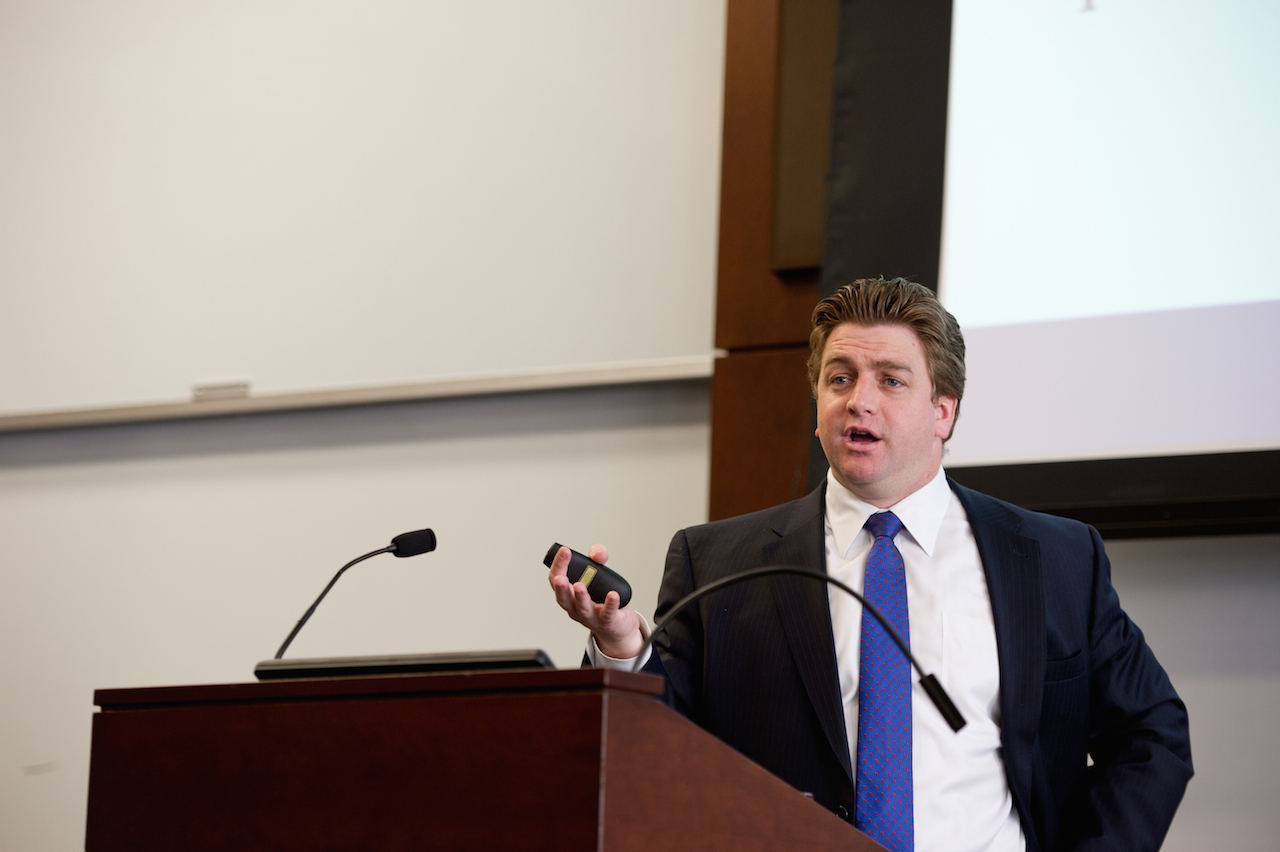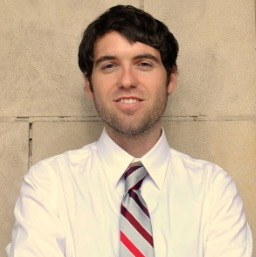
Sitting FTC Commissioner speaks at Penn Law on the limits of judicial and agency expertise.
Amid reports that the Federal Trade Commission (FTC) is considering a lawsuit to stop the proposed merger of two of the biggest food suppliers in the country, sitting FTC Commissioner, Joshua D. Wright, offered a sobering perspective to Penn Law students last week on just how often the main institutional actors charged with enforcing antitrust law—the FTC and federal courts—make sound decisions. The reality on the ground is not encouraging, according to Wright, who was not speaking in his official capacity but rather was reporting on his own scholarly research.
Motivating Wright’s talk was what he called the “expertise hypothesis,” which holds that because a federal agency like the FTC can amass higher levels of subject-matter expertise, it should be given greater deference in how it interprets the Federal Trade Commission Act’s catch-all Section 5, which prohibits “unfair methods of competition.” That expertise hypothesis, held widely by both policymakers and members of the public, also is often used to justify giving authority to regulatory agencies throughout the federal government.
Wright noted that part of the persistence of the expertise hypothesis in the antitrust context has to do with how poorly the FTC’s main institutional alternative—the federal judiciary—fares in deciding cases. Wright’s prior empirical research with Michael R. Baye has shown that “some antitrust cases are too complicated for generalist judges,” as indicated by high appeal rates.
Given the poor performance of most courts in antitrust cases involving complex economic issues, many policy observers put their faith in the purported expertise of the FTC, arguing that it ought to play a bigger role in antitrust enforcement. But additional research by Commissioner Wright, conducted with Angela M. Diveley, casts some doubt on whether that would be wise. Wright and Diveley’s research compared the appeal and reversal rates of the Commission’s own decisions with the appeal and reversal rates for federal trial courts in these same kind of cases. Across the board, the commissioners’ decisions were far more likely to be appealed and reversed than decisions by federal judges. Indeed, they found that a reversal by a U.S. Circuit Court of Appeals was four times more likely if the initial antitrust decision was made by the Commission rather than a trial judge. Their findings held up even when a variety of controls for case type and time trends were included in their statistical models.
 Wright hypothesized that at least part of the disparity may arise from the benefits of the adversarial process that takes place in cases decided by federal judges. When judges decide antitrust cases, they often draw on the testimony of expert witnesses, friend-of-the-court briefs, and formal rules of evidence and trial processes that may add something beyond the more technocratic economic study that goes on within the agency.
Wright hypothesized that at least part of the disparity may arise from the benefits of the adversarial process that takes place in cases decided by federal judges. When judges decide antitrust cases, they often draw on the testimony of expert witnesses, friend-of-the-court briefs, and formal rules of evidence and trial processes that may add something beyond the more technocratic economic study that goes on within the agency.
In their paper, Wright and Diveley also show that the FTC’s Commissioners generally do not add significant value to the initial opinions of administrative law judges (ALJs). In fact, Wright said that the Commission has for years overturned its ALJs in 100 percent of the instances when an ALJ rules against the agency—a statistic that seemed to stun many in the audience assembled to hear Wright speak – possibly suggesting that the Commission is not as committed to expertise in antitrust as it often claims.
Although Wright’s research centered on the FTC, and on antitrust enforcement in particular, it is clear that the research could have ramifications across the administrative state. Expertise-based arguments are a primary reason that courts generally give agencies deference in reviewing agency decisions. It is also a foundational premise underlying the delegation of broad and far-ranging authority to agencies to regulate the economy, health, safety, and welfare.
To the extent that Wright’s research shows that even an agency that has substantial economic firepower within its personnel ranks can in fact commit systematic errors, it raises questions about the institutional design of agencies and their ability to maximize the benefits of whatever expertise they have assembled on their staffs.
 Nevertheless, Wright was quick to caution reading too much into the findings for other agencies. Findings from antitrust cases might not apply when it comes to environmental regulation, for instance. Whether the U.S. Environmental Protection Agency or other administrative agencies can legitimately claim a comparative advantage over courts is an empirical question susceptible to further study.
Nevertheless, Wright was quick to caution reading too much into the findings for other agencies. Findings from antitrust cases might not apply when it comes to environmental regulation, for instance. Whether the U.S. Environmental Protection Agency or other administrative agencies can legitimately claim a comparative advantage over courts is an empirical question susceptible to further study.
Of course, in the antitrust context, the research Wright presented does not seem to inspire confidence in either courts’ or the FTC’s governing capacity.
Wright’s presentation underscored the need for researchers and policymakers to invest more energy in experimenting with new ways to harness expertise in increasingly complex regulatory arenas. Doing so may involve modest personnel or organizational reforms in agencies, but it also may require deeper structural reforms. As new challenges emerge and regulatory problems become more complex, it seems clear that neither agencies nor courts can rest on their laurels.




